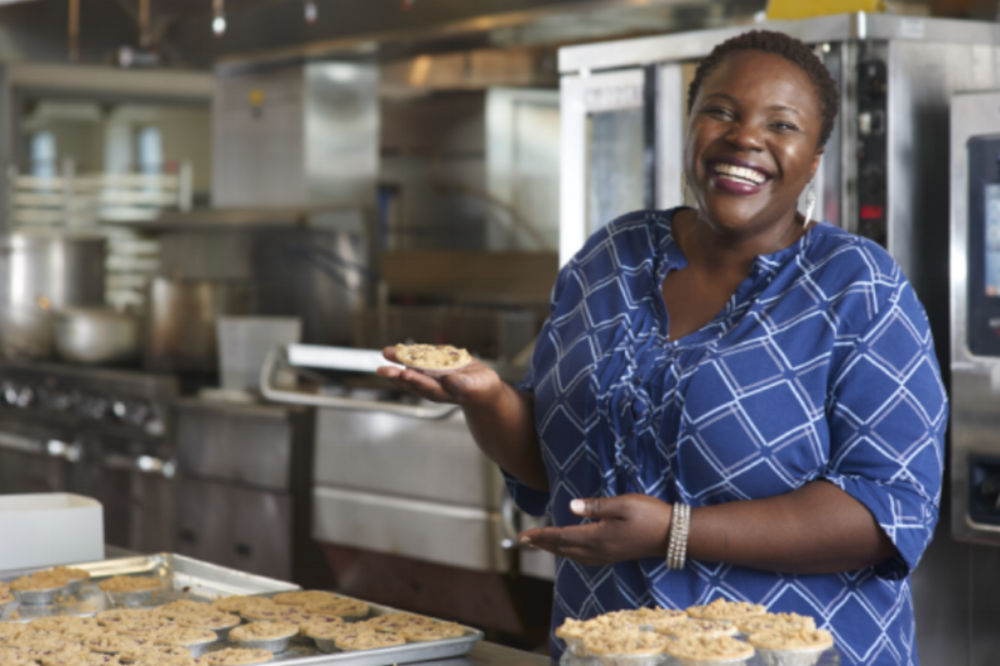We are excited to spotlight CommonWealth Kitchen in our Forces for Good Food series.
CommonWealth Kitchen is Greater Boston’s only food business incubator / accelerator and integrated “small batch” food manufacturer, providing shared-use kitchens, wrap-around technical support, coordinated access to markets, and outsourced manufacturing to over 55 food companies. They are focused on creating an equitable food economy by promoting inclusive entrepreneurship for people who have been impacted by racial, social, and economic inequality.
CommonWealth Kitchen opened in 2014 with a mission to be a collaborative community, providing shared kitchens combined with business assistance to help aspiring food entrepreneurs build great companies, create jobs, improve healthy food access, and strengthen the regional food economy. Since opening, they have created over 500 jobs and have helped launch over 200 businesses. Their work is creating a diverse interconnected business ecosystem—every successful food company owned by a woman or person of color makes the path easier for the next one.
In 2017 New Venture Advisors worked with CWK in developing a roadmap for its complex set of programs to achieve financial goals. We had the opportunity to catch up with Executive Director, Jen Faigel, to hear how their programs are evolving and creating new opportunities for local food businesses and diverse entrepreneurs.
A Model Built for Success
CommonWealth Kitchen started with an economic development focus, leveraging food as a way to create successful businesses. They quickly realized, however, that the kitchen is much more. It provides a supportive community for members who are mostly women and people of color. And the needs of their members extends beyond access to space and equipment. One of the biggest is helping them develop their ideas into a viable business.
CommonWealth Kitchen went to work restructuring their programs to be more relevant to their community. CWK introduced its own curriculum, Food Biz 101. This 13-week course covers topics from running a business to pricing and marketing. The best teachers? Current member companies who are able to relate their first-hand experiences which are invaluable to their peers—along with lawyers and other business professionals.
Many of the businesses that complete the course join CommonWealth Kitchen. CWK has a three-phase model to help each member set up their business, solidify their product, and prepare for growth.
- Incubation Stage – Applicants who are accepted to join the kitchen must first complete a comprehensive training which focuses on the entrepreneur—to develop the human capital needed for the business to succeed. They are invited to attend a monthly meeting with their fellow cohort members and complete a lengthy onboarding process so that by the time they start in the kitchen, they are prepared to work effectively.
- Startup Stage – Once members obtain a food handlers permit, they start production in the kitchen. CommonWealth has a support staff who are available to help. Moving into a commercial kitchen and producing to scale is a challenging first-time experience for many. CWK has found that this personalized service has a long-term cost benefit: developing member businesses who work more quickly, create efficient systems and streamline manufacturing to cut down on the time they need to rent in the kitchen.
- Growth Stage – Business that have been operating for one to two years with a firm understanding of their product can enter the final stage. CommonWealth Kitchen lowers kitchen rates by 20% to incentivize businesses to scale production and plan for a graduation to co-packing or into their own facility. Reducing kitchen rental costs leaves them with more capital to put towards growth-related expenses, such as producing sell sheets than enable them to sell into retail markets and/or distributors. In 2018, CWK also opened a separate kiosk kitchen that they rent to growth stage companies on a rotating basis every 6-12 months. This gives caterers time to build a customer base and cash flow so they can potentially open their own restaurant.
In addition to creating a staged model to help their entrepreneurs succeed, CommonWealth Kitchen is creating an ecosystem that allows these businesses to flourish. For instance, they have built a portfolio of local businesses that represent the diversity in Boston (almost 80% of their member businesses are owned by women, immigrants, and/or people of color) and are attractive to institutional buyers with diversity purchasing goals. They also see their established food companies as a great asset to mentoring newer members, and offer those who take the time to assist startups free kitchen hours in return.
Beyond the Kitchen
To better help small businesses scale, CommonWealth Kitchen started a fully-staffed, separate manufacturing kitchen. While a unique and beneficial service to their members, it has not been a solution free of challenges. On one hand, there is not always enough work for the full-time staff, and there are inherent inefficiencies in a kitchen producing over 80 different types of products in a year.
To address these challenges, CommonWealth Kitchen began offering value-added processing for local farmers with excess produce. They developed master recipes for products that are in abundance in New England to process, package and label them. Farmers can then sell these packaged goods made with their harvest at their own farms, bringing extra revenue and diversifying their business.
CommonWealth Kitchen also began partnering with institutions interested in “fresh, local” products. They built relationships with Harvard, MIT, Boston Children’s Hospital (and even Sam Adams for a separate line of products). Products made by CWK members would stand little chance of gaining distribution on their own, but the CommonWealth Kitchen “label” helps pave the way. This was how sauces from the kitchen found their way into Harvard’s current menu offerings.
Jen is quick to note that the co-packing business still faces challenges, but overall, it is getting closer to becoming a sustainable, viable entity.
How to Support
CommonWealth Kitchen is an innovative, non-profit kitchen incubator among a small but growing class of kitchen incubators with an ambitious vision, complex model and devotion to including those who are often left out. We are proud to have worked with them and thankful that they share their learning as they adapt and expand. Visit their website to read more about their current programs, and consider donating to support diverse entrepreneurs building an equitable ecosystem.
(Photo of Sweet Teez Bakery, courtesy of CommonWealth Kitchen)



